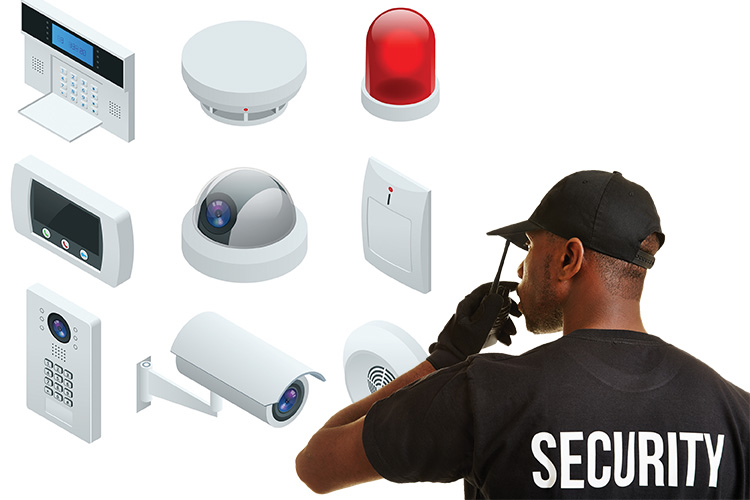Improving the response time to security system activations
When investing in a security system, either for a home or business, how do you know you are choosing the right system that will get the right response from the emergency services?
Security systems are one of the many essential tools in the fight against crime, and in particular, burglary, theft and robbery. Academic research shows professionally installed and maintained alarm systems provide a greater deterrent and properties fitted out with them are less likely to be targeted by criminals. Burglars want easy pickings and avoid properties with effective security.
Types of alarm systems
First off, a word about DIY alarms – these are not recommended at all. Whilst these DIY kits may provide a cheaper alternative, the National Police Chiefs’ Council (NPCC) does not recommend them as the alarm system may not be designed to meet the needs and risks of a particular property and very often, problems with installation, maintenance and reliability may not become clear until a burglary has actually occurred.
The two main types of alarm systems are audible alarms and monitored alarms. However, they operate differently and are treated differently by the police.
Audible alarms sound a loud siren or bell, designed to scare a burglar and alert neighbours and passers-by at the scene, hoping that they will then call the police to report a crime in progress.
In contrast, monitored alarms are just that – monitored 24/7 by an approved commercial ‘Alarm Receiving Centre’ or ARC. When an alarm is triggered, the ARC immediately checks the signal to verify it is a genuine alarm, alerts a keyholder and, if compliant, the police.
When will police attend?
However, a key point to note is the police will attend an alarm signal from a monitored alarm as long as the system complies with the NPCC Security Systems Policy, which details how the system is installed, monitored and maintained. It also requires security companies providing this service to be approved by an Independent Inspectorate Body – the NSI or SSAIB – and registered with the local police force.
Compliant alarms and reputable installation companies and ARCs are essential to ensure that there is an appropriate response to an alarm activation. If the alarm is not compliant there will not be an immediate police response, something which could be vital if someone is in immediate danger or property is being stolen.
The NPCC Security Systems Group
Police Crime Prevention Initiatives (Police CPI) provides the Secretariat to the NPCC Security Systems Group to monitor police strategies and technical developments and advise on policy requirements, as well as provide support to police forces and the private security industry on the administration of police response to security systems.
Police CPI works closely with the national alarm inspectorate bodies and trade organisations for the security industry – the NSI, SSAIB, BSIA, as well as the Fire and Security Association (FSA). This work seeks to progress a partnership approach with the private security industry, specifically to improve the performance of security systems and increase the preventative impact and detection rate emanating from such systems.
Fewer false alarms
This partnership approach has heralded much success. Since 1995 there have been 1.1 million fewer calls to police to respond to false alarms or alarms involving faulty equipment, reducing from 1,188,386 in 1995 to 85,146 in 2020 despite the number of registered alarm systems almost doubling. The number of burglaries from properties with police- compliant security systems has also reduced significantly from 135,990 in 1995 to 11,109 in 2020.
The NPCC is currently working with the alarm industry towards having alarm activations from compliant systems passed electronically, direct from ARCs into police control rooms, via the development of the ECHO (Electronic Call Handling Operations) initiative.
The ECHO alarm transfer service is currently being rolled out to police forces across the country and facilitates greater effectiveness in police response to emergency alarms. It is a fully automated electronic alarm transmission service between ECHO-connected ARCs and the police, eliminating communication errors and delays associated with manual telephone call handling, to ultimately provide a quicker police response.
ECHO delivers time savings in circumstances where ‘every second counts’ as blue light services respond to emergency alarms. Alarm signalling to the police via the ECHO hub replaces traditional manual handling of alarm calls (by voice calls) between the ARC and the blue light responder. This can save between one and four minutes in response times by the police.
The Metropolitan Police and Essex Police were the first forces to be ECHO-connected in 2021, with Avon & Somerset and Northumbria constabularies following in 2022. With over 240,000 alarm installations now ECHO-connected and supported by ECHO, tangible benefits are already being delivered, including improved police alarm response times and more effective deployment of police responders to ECHO-connected alarmed premises.
Ken Meanwell
Compliance Manager
Police Crime Prevention Initiatives, secretariat for the National Police Chiefs’ Council Security Systems Group


